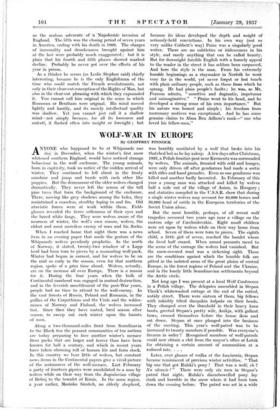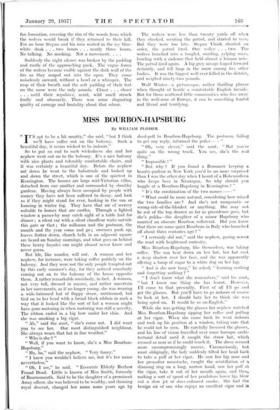WOLF-WAR IN EUROPE
By GEOFFREY PINNOCK
ANYONE who happened to be at Whipsnade one day in December, when the winter's first snow whitened southern England, would have noticed strange behaviour in the wolf enclosure. The young animals, born in captivity, took no notice of the sudden arrival of winter. They continued to loll about in the frosty sunshine and jump and tussle with each other like puppies. But the demeanour of the older wolves changed dramatically. They never left the screen of the tall pine trees that form the background of the enclosure. There, moving like grey shadows among the boles, they maintained a ceaseless, stealthy loping to and fro. Old atavistic forces were at work within them. Field- glasses revealed the fierce sullenness of their eyes and the bared white fangs. They were wolves aware of the nearness of winter, the wolf's own season, wolves, the oldest and most merciless enemy of man and his flocks.
When I reached home that night there was a news item in an evening paper that made the gesture of the Whipsnade wolves peculiarly prophetic. In the north of Norway, it stated, twenty-two reindeer of a Lapp herd had been torn to pieces by a marauding wolf-pack. Winter had begun in earnest, and for wolves to be on the raid so early in the season, even for that northern region, spoke of a grim time ahead. Wolves, actually, are on the increase all over Europe. There is a reason for it. During the four years when the bulk of Continental manhood was engaged in mutual destruction, and in the feverish unsettlement of the post-War years, people had no time to attend to the wolf-enemy. In the vast forests of Russia, Poland and Rumania, in the gullies of the Carpathians and the Urals and the wilder- nesses of Norway and Finland, the wolves increased Ast. Since then they have mated, bred season after season, to sweep out each winter upon the haunts of man.
Along a two-thousand-miles front from Scandinavia to the Black Sea the peasant communities of ten nations are today preparing to face another winter's menace from packs that are larger and fiercer than have been known for half a century, and which in recent years have taken alarming toll of human life and farm stock. In this country we hear little of wolves, but constant news items in the Continental papers give a vivid picture of the seriousness of the wolf-menace. Last February a party of fourteen gipsies were annihilated to a man by wolves while on their way from the Jugoslavian village of Doboj to the townlet of Krnia. In the same region, a ycar earlier, Marinko Simitch, an elderly shepherd, was horribly mutilated by a wolf that broke into his thatched but as he lay asleep. A few days after Christmas,.
1932, a Polish frontier-post near Krementz was surrounded by wolves. The animals, frenzied with cold and hunger, were only driven off after gendarmes had made a sortie with rifles and hand grenades. Even so one gendarme was killed and another badly lacerated. In February of this year a young man was attacked and killed by wolves half a mile out of the village of Anina, in Hungary ; and statistics compiled in the U.S.S.R. show that during a single winter wolves may account for 40,000 horses and 50,000 head of cattle in the European territories of the Soviet Union alone.
But the most horrible, perhaps, of all recent wolf tragedies occurred two years ago near a village on the eastern edge of Czechoslovakia. Eight small children were set upon by wolves while on their way home from school. Seven of them were torn to pieces. The eighth child, a little girl of seven, reached the hamlet where she lived half crazed. When armed peasants raced to the scene of the carnage the wolves had vanished. But the snow-covered road was a sickening sight. These are the conditions against which the humble folk are pitted in the isolated areas of the great plains of central Europe, in the forest regions of Poland and the Ukraine, and in the lonely little Scandinavian settlements beyond the Arctic circle.
Not long ago I was present at a local Wolf Conference in a Polish village. The delegates assembled in Stepan Vlasik's whitewashed cottage at the end of the rutted, untidy street. There were sixteen of them, big fellows with rakishly tilted sheepskin kalpaks on their heads.
They clumped over the threshold in their heavy knee boots, greeted Stepan's pretty wife, Anikja, with gallant bows, crossed themselves before the house ikon and sat down. Stepan at once plunged into the business of the meeting. This year's wolf-patrol was to be increased to twenty members if possible. Was everyone's firearm in order ? Recognised members of wolf-patrols could now obtain a chit from the mayor's office at Lutzk for obtaining a certain amount of ammunition at a reduced rate. . . .
Later, over glasses of vodka at the kawiarnia, Stepan became reminiscent of previous winter activities. " That big one that got Rulski's pony ! That was a wolf, eh ? Na zdrowie ! " There were only six men in Stepan's patrol that night Rulski's disembowelled pony lay stark and horrible in the snow where it had been torn down the evening before: The patrol was set in a wide fan formation, covering the rim of the woods from which the wolves would break if they returned to their kill. For an hour Stepan and his men waited in the icy blue- white dusk . . . two hours . . . nearly three hours. No talking. No smoking. Not a movement. . . .
Suddenly the night silence was broken by the padding and rustle of the approaching pack. The vague forms of the wolves became visible against the dark wall of the firs as they surged out into the open. They came noiselessly onward, without a howl or a whimper. The rasp of their breath and the soft padding of their feet on the snow were the only sounds. Closer . . . closer . . . until their repulsive, acrid, wild smell struck foully and obscenely. There was some disgusting quality of carnage and brutality about that odour. The wolves were less than twenty yards off when they checked, scenting the patrol, and started to veer. But they were too late. Stepan Vlasik shouted an order, the patrol fired. One volley . . . two. The wolves bunched into a tangled, snarling, yelping mass, howling with a cadence that held almost a human note. The-patrol fired again. A big grey savage leaped forward defiantly, and fell limp in the snow among five other bodies. It was the biggest wolf ever killed in the district, and weighed ninety-two pounds.
Wolf Winter—a picturesque, rather thrilling phrase when thought of beside a comfortable English fireside. But for those scattered little communities who live away in the wolf-zone of Europe, it can be something fearful and literal and terrifying.























































 Previous page
Previous page